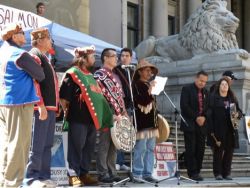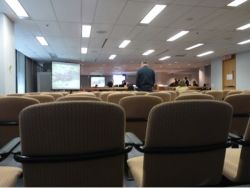Aquaculture issues fill the courtroom
BLOG POST about MediaIndigenousEnvironmentDirect Action posted on September 9, 2011 by Editor
This blog post was written for the VMC by Elena Edwards.
On September 7, all 130 seats in Room 801 of the Federal Courthouse were filled for the second time since the Cohen Commission’s federal Inquiry into the Decline of the Fraser River Sockeye Salmon commenced last October 25th, 2010.
The draw was Dr. Alexandra Morton, who appeared as a witness for the final days of Aquaculture.
While it may not have matched the 5000 people that gathered to support her last May at the Legislature in Victoria, the energy in the courtroom was intense, with hundreds of others tuning in via livestream audio provided by activists and facebook event page Salmon Inquiry-Cohen Commission Watch. Dr. Morton’s support has grown to the tens of thousands as she has led the battle against fish farms together with First Nations from the Broughton Archipelago in whose territory fish farms reside, standing by her side throughout her ongoing efforts to see the threat to wild salmon removed from open waters.
While this $25 million public inquiry is supposed to be, well, public, there has been an incredible amount of secrecy and very little media attention to a process that may very well decide the future of wild salmon. The past ten months the Cohen Commission has quietly been ongoing, examining everything from over escapement to mining to global warming. Seldom were there more than 15 people present for the examination of any of these topics. All of that changed when the topic of diseases and Aquaculture began on August 22nd.
On August 24rd Dr. Kristi Miller, head of Molecular Genetics for DFO, testified in court, accompanied by bodyguards due to the intense scrutiny she’s been under since her discovery of a virus that may be killing wild salmon. Headlines in media from Vancouver to Seattle stated that the Canadian government was muzzling one of its top scientists from sharing her concerns about the virus. Dr. Miller was instructed by Privy Council to refrain from speaking to the media, in spite of Time magazine wishing to interview her. Ultimately, what came from Dr. Miller’s testimony was that there was a parvovirus identified, but due to government to cuts she cannot continue research to confirm the source (which is suspected to be the open net fish farms) of the virus.
Dr. Morton has long been asserting that the farms were an undeniable factor in the decline of wild salmon that government was failing to acknowledge, in spite of increasing evidence damning the farms as the culprit. After years of blowing the whistle on this industry of which 92% of the farms are Norwegian owned, Dr. Morton was finally heard on record for the government with testimony that held such honesty as to make one’s hair stand on end and elicit cheers from those packed in the courtroom.
Sharing the witness panel with Dr. Morton was Clare Backman, director of Environmental Compliance for Marine Harvest Canada, Mia Parker, a DFO employee and former manager for Grieg Seafood BC Ltd. and Catherine Stewart for Living Oceans Society. The cross examination saw many objections from lawyers for the government of Canada, Province for B.C. and the BC Salmon Farmers Association throughout Dr. Morton’s testimony. Over the months past it has become increasingly clear that the government, via DFO, is heavily invested in the salmon farming industry, which may account for the numerous objections to the indicting content put forth by Dr. Morton.
Under questioning by the council for the commission, Dr. Morton did not hesitate in stating the need for government to “free the scientists” to do the necessary studies to ascertain where the disease is coming from and take necessary measures to protect wild salmon. When asked if she thought that fish farms and wild salmon could coexist, she gave a resolute “No” as her answer, never swaying from the assertion that it is biologically not possible for the farms to be free of diseases that pose a threat to wild salmon, nor can they ever be correctly regulated.
Sitting up front in support of Alexandra Morton were Grand Chief Stewart Phillip of the Penticton Indian Band and president of the UBCIC, Hereditary Chief Robert Joseph of the Kwagiulth nation, Chief Bob Chamberlin of the Kwicksutaineuk Ah-kwa-mish First Nation, and Hereditary Chief William Wasden of the Namgis First Nations alongside others who have been fighting to get the farms out of First Nations territory for many years.
September 8th sees the final day of Aquaculture as the Cohen Commission nears its end. Justice Bruce Cohen will have until June of 2012 to make his final recommendations to Ottawa based on his findings throughout the commission.
Until then, the battle to get open net fish farms out of the oceans and away from wild salmon will continue by the many who are dedicated to seeing wild salmon a priority over industrial salmon farms.
Further blogs on the Cohen Commission can be read at:
http://alexandramorton.typepad.com/alexandra_morton/2011/09/today-i-am-on-the-stand.htmlhttp://coheninquirynotes.blogspot.com/2011/09/aquaculture-industry-vs-wild-salmon.html
http://www.superheroes4salmon.org/blog/clusterfuck-cohen-commission
More info on the battle against fish farms at:
The site for the Vancouver local of The Media Co-op has been archived and will no longer be updated. Please visit the main Media Co-op website to learn more about the organization.



Comments
Thanks for this clearly
Thanks for this clearly written article!
Aquaculture issues fill the courtroom
This blog refers to A. Morton as Dr. Her bio on Wikipedia only mentions a BS degree.
Trying to find out the details using Google Scholar search engine on Dr. Miller's parvovirus in salmon failed to find any scientific articles or publications on this virus that "may" be killing wild salmon. The lack of publication could mean the work is very preliminary and the data insufficient to publish. Finding a new virus with today's molecular technology is relatively easy, showing that the virus is a pathogen requires showing that a disease can be caused by the virus.
Another interpretation of the lack of published scientific data on this parvovirus is that it has not been found to be a pathogen or found in the Atlantic salmon being farmed (it is hard to get negative results published in scientific journals). However, the virus' existence plays into the confirrmation bias of Ms. Morton and Dr. Miller and is becoming an "advocacy science" fact in their minds.
All life forms -- from bacteria to humans -- support a huge number of viruses, most of which are irrelevant. Recent research has shown that virus are the most common type of life form in the oceans of the world.
This get us to the question of "so you found a virus, so what?". Is that virus relevant to anything? Or is it just another of the thousands of types of "new" virus found in every drop of water.
The thought of impacting a billion dollar aquaculture industry with so little scientific justification is absurd.
Secrecy?
Dear Ms Edwards,
Secrecy? What secrecy? Did you know that there is a dedicated website from the Cohen Commission to keep the public up to date on the testimony and exhibits presented as well as the rulings ( http://www.cohencommission.ca/en/). Perhaps it wouldn't be such a secret if you would have posted the link in your article. Did you also know that these proceedings were open to public viewing - not just the aquaculture portion? I don't remember reporters being banned from covering the proceedings nor do I remember reporters being banned being inside the courthouse. It's not the commission's fault if the media and some members of the public were asleep through most of the testimony or didn't seem it was important enough. It appears that the only reporter that has taken much interest in the inquiry is Mark Hume from the Globe and Mail. Perhaps if some media people stopped following what the anti-fish farm blogs had to say they would have been more informed what was going on with the inquiry.
reply to Steve
Steve,
I think you misconstrued some points made in Ms Edwards article. The public was not kept up to date with testimonies and exhibits - some took over 3 weeks before they were online, and some are still not posted. Many attempts were made to get permission to broadcast on TV the daily court proceeding, but this was never allowed.
But I think what Ms Edwards is referring to when she talks about "secrecy" is the secrecy within the aquaculture industry and within DFO that was revealed in the Cohen Commission. For example, internal memos that were released that showed us that certain findings were being "shushed" up; the resistance by the aquaculture industry and the government to release the disease records and the fish health data; the days and days of bargaining about how many years of data and from how many farms would be released; scientists being disallowed to talk about their findings with other scientists, the public, or media. The list goes on and on, but I think it is this type of secrecy the reporter is referring to.
It is impossible to have a full investigation if some records are not released and scientists are not allowed to talk about their findings and even retract on their findings.
reply to A.McC.
I do not believe that I misconstrued some of the points of the article. First, you and others should know that testimony from the inquiry has to go through official translation before it can be posted. This is a requirement under law that all inquiries of this nature must follow. I realize that the public cannot understand the time delay. In this day and age we expect everything instant. They figure that someone is eagerly typing away and.....poof....it's done and ready to read - not so. Second, I disagree with the delay in the exhibits as they posted almost immediately. For instance, check September 15th on the Cohen Commission website. Do you see exhibits? I certainly do. Why do these proceedings have to be on television when the testimony and exhibits are provided for the public for free online. By reading the testimony and looking at the exhibits it forces the public to look a little deeper at this instead of having it spoon fed to them.
Can you show me these internal memos that show a coverup between DFO and the aquaculture industry? You have me interested. The resistance to releasing disease records and fish health data is totally overblown. The Province of BC has been releasing annual reports of fish health at fish farms for years on their website. The issue was the release of raw data which had vet confidentially attached to it; however, the industry has been more than willing to release this information. There was a problem in releasing other information and this was clearly outlined in Judge Cohen's ruling (http://www.cohencommission.ca/en/pdf/Rule19ClarificationRuling.pdf#zoom=100). All these rulings are also made public. No secrecy here.
What is secret about Dr. Miller's work? Although I do not necessarily agree with the Privy Council, but Dr. Miller's work was clearly published in the journal Science and was even reported on in 2008 (http://www.thefishsite.com/fishnews/8561/genomic-projects-tackle-aquaculture-problems). In my opinion, it did not really matter if Dr. Miller was muzzled or not because there are some people that were definitely not really listening to her testimony or the testimony of her co-authors anyway. Instead it was modified by critics to conform to their beliefs. I encourage people to read the testimony and the exhibits themselves and make up their own mind.
It is impossible to have a full investigation when people start speculating on the what the results should mean. Maybe we should wait until the inquiry is over before we judge the findings.
Having just read Dr. Millers
Having just read Dr. Millers paper in Science (http://www.sciencemag.org/content/331/6014/214.full?sid=d7250030-605a-48...), the case for the existance of a virus is based upon the upregulation of a group of genes in the fish with a higher probabiliy of dying. Some of these genes that are may be responding to a virus. However, no virus has been isolated or grown in salmon cell culture (at least not in the recent paper -- as of jan 2011). No primers or identification of the virus are presented and no indication that they have a clue about what virus.
If you don't even have a primer to genetically identify a specific virus and can't grow it in cell culture, how can you even check whether farmed salmon have this virus. From the scientific data presented in the Journals, it hasn't even been proven that a virus is the problem (just suspected) and a virus suspect hasn't even been identified or specified.
I may agree that a virus is a worthwhile suspect and would be looking for it with cell culture and trying to transfer the "problem" and gene expression profile from one fish to another. However, this science is very far away from even finding a new viral pathogen (I assume they were smart enough to test for all the known salmon viral pathogens that we have primers for), let alone associating it with fish farms.